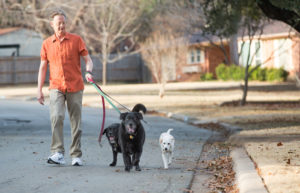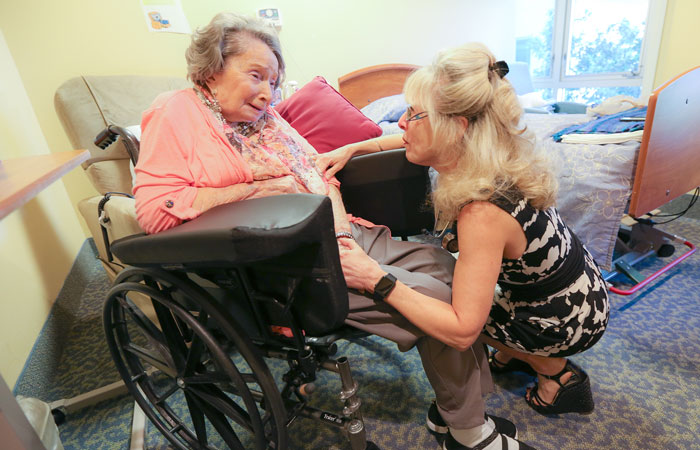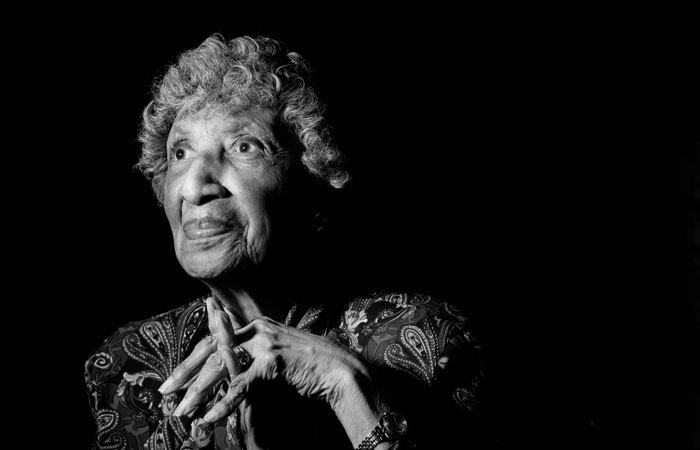Happy, healthy and 100
By Jan Jarvis
Though she’s 100 years old, a little arthritis doesn’t do much to slow down Mae Cora Peterson.
She lives alone, starts her day with a round of crossword puzzles and goes to church on Sunday. Sometimes she needs to be reminded to use her cane as she rambles around the Fort Worth home she has lived in for more than a half century. Until a few months ago, she drove her own car.
This long-time educator, symphony supporter and grandmother not only has lived a long life, she has lived it well. And she is the kind of role model researchers point to when they describe optimal aging.
Her blood pressure is normal, she has never had a major medical problem and she takes only two prescriptions, both of them eye drops to fend off glaucoma. Whether luck or her penchant for green salads contributed to her longevity, no one knows for sure.
“I can’t explain it,” she said. “But I do know I feel so blessed.”
Although more than 54,000 Americans are 100 or older, how they get there varies drastically. Some credit brandy and cookies; for others it’s a plant-based diet. All grew up in an era when fast foods didn’t exist and exercise came in the form of chores or work.
The science behind getting older is the work of researchers and clinicians in the Institute for Healthy Aging at UNT Health Science Center. Operating under the umbrella of the institute are three centers that integrate clinical care, research, innovative education and community engagement to create a new era of enduring quality of life. They are:
- The Center for Geriatrics, which is a North Texas leader in providing care to older adults.
- The Center for Alzheimer’s and Neurodegenerative Disease Research, which takes a translational approach to research in hopes of assisting those suffering from brain diseases.
- The Center for Neuroscience Discovery, which explores the biological basis of brain disease and injury.
Whatever the approach, the goal should be to live the longest, healthiest life possible, said Kunlin Jin, MD, PhD, Professor in the Center for Neuroscience Discovery.
“I believe people can live to 150, and that’s not a joke,” he said.
Optimal aging doesn’t have to mean a person is disease-free, said Janice Knebl, DO, Director of the Center for Geriatrics at UNTHSC and holder of the Dallas Southwest Osteopathic Physicians Endowed Chair in Geriatrics.
“It means you still have a chance to be the best you can be,” she said.
The magic formula: Diet + exercise

Every night without fail, Gus and Isabella hit the road for a two-to-three mile walk.
It’s a ritual the energetic border collie-lab mixes have followed all of their lives – and for good reason.
Their owner, Michael Forster, PhD, is recognized internationally for his research on human aging. For 30 years, he has been studying how people can live healthier, longer lives.
Exercise might not be the fountain of youth, but for humans (and their canines), it might be one of the best defenses against aging.
“The bottom line is this: If you want to stay healthy for a long time, exercise regularly and don’t allow yourself to get overweight,” said Dr. Forster, Executive Director of the Institute for Healthy Aging.
Dr. Forster said he believes it’s not so much what people eat, as it is how much. He limits his calories with the goal of maintaining health and living longer. He keeps his caloric intake at 2,000 per day, walks 15,000 steps daily and takes the stairs whenever possible.
“This is just the way it works out for me to not gain weight, lead a normal life and avoid time-consuming trips to the gym,” he said.

Diet, exercise and controlling stress all matter, Dr. Knebl said. But so, too, does attitude and spirituality.
“People need to stay actively engaged,” she said. “They need to find a sense of purpose, whether that’s through volunteer work or something else.”
There’s a genetic component as well. Studies have found that the siblings and children of centenarians live longer, and when they do develop a disease, it’s later in life. Genes are believed to play a role in longevity for about 25 percent to 50 percent of people.
“But you can’t choose who your parents are, so you might as well focus on what you have control over,” Dr. Knebl said.
The science of aging
Inflammation plays a role in age-related diseases such as diabetes. By fighting inflammation, it may be possible to prevent diseases associated with aging, Dr. Forster said.
Oxidative stress and its impact on the body has long been the focus of aging research. Dr. Forster and Dr. Jin, along with Nathalie Sumien, PhD, Associate Professor in the Center for Neuroscience Discovery, have studied its role in age-associated brain dysfunction for much of their careers, but they aren’t convinced it plays a big part in getting old.
For years, antioxidants were hailed as the fountain of youth, but there’s no scientific proof that they work in humans to reduce the effects of aging, Dr. Sumien said. Of even more concern is research showing antioxidants may cancel out the beneficial effects of exercise and other interventions.
“The research community is not fond of antioxidants, but there’s a big population out there that still believes in it,” she said. “That’s why today it is a billion-dollar industry.”
At the Second International Conference on Aging and Diseases, sponsored in part by UNTHSC, experts from around the globe explored interventions that could add years of healthy living. One major topic at the conference: Gender makes a significant difference in whether anti-aging interventions are successful in animal studies.
On the list of “male” life extenders is acarbose (an anti-diabetic drug), 17-alpha estradiol (a non-feminizing estrogen), NDGA (an antioxidant/anti-inflammatory) and aspirin. The antibiotic rapamycin has better effects in females.
Research on the widely advertised diabetic medicine meformin also suggests it could extend the healthy lifespan. A Belgium study found that the drug caused roundworms to age slower and add about 40 percent to their lifespan. A recent study showed it helped humans live longer, too.
This year the Targeting Aging with Metformin trial will involve 3,000 people and explore whether the drug can increase lifespan. It’s considered the first medication to be tested in a clinical anti-aging intervention trial.
“To be most effective, you may really need to start these interventions in your 30s or 40s to prevent long-term consequences,” Dr. Forster said. “The goal of any anti-aging intervention strategy is to allow people to live longer and suffer less. No one wants to use anti-aging interventions that extend life but increase health care costs while decreasing independence and quality of life.”
The centenarian
Mrs. Peterson said living to 100 caught her by surprise, but she’s had to sacrifice little in the way of independence and quality of life.
Married in 1947, she had three sons and became dean of girls and vice president at Fort Worth’s Dunbar High School before retiring in 1980. She stayed active, supporting the Fort Worth Symphony and serving on various boards in the community.
She outlived all five of her siblings, her beloved husband James after 45 years of marriage and her oldest son. Always deeply religious, she relies on her faith to get her through the grief.
Although she has never exercised nor followed a strict diet, she does favor home-cooked meals. She’s up every day by 8 a.m. to open the garage door for her aide, who helps with errands. And she takes nothing for granted.
“I’m not at the point where I can’t get around,” she said. “I know I’m fortunate.”







Social media